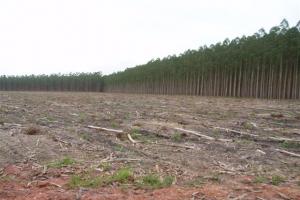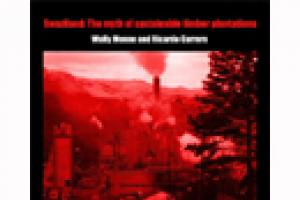Veracel Celulose – a joint venture between the Swedish-Finnish company Stora Enso and the Norwegian-Brazilian company Aracruz Celulose - has launched a process to obtain FSC certification for its eucalyptus plantations in the extreme south of the State of Bahia. For this purpose, it has hired the consulting firm SGS.
The Green Economy
The Green Economy is a tactic used to “clean up” the image of corporations rather than address corporate capture and capitalism as the true drivers of deforestation. False solutions promoted under the Green Economy include certification, sustainable forest management, ecosystem services, REDD+, the bioeconomy, nature-based climate solutions, and zero net deforestation. Rather than stopping it, these “solutions” support corporate-driven destruction that is causing a deep social and ecological crisis.
Bulletin articles
18 August 2007
Once again, Stora Enso and Aracruz are using their economic power to mislead and wheedle. In addition to misleading and wheedling the Brazilian people, they are now misleading and wheedling Northern society with the aim of increasing the price of their products, increasing their sales and therefore, their profits! With this purpose, the Veracel pulp company presented itself voluntarily to FSC certification and resorted to SGS ICS, with headquarters in Sao Paulo, as certifying body.
7 August 2007
Veracel - which belongs to the Swedish-Finnish company Stora Enso and the Norwegian-Brazilian company Aracruz Celulose - is attempting to obtain certification for its plantations established over 78,000 hectares in the extreme south of the State of Bahia and its impacts are causing major local resistance.
Bulletin articles
18 July 2007
In 2002, under the Tenth Plan, the Indian government set the national goal of having 33 percent of the country’s geographic area under “green cover” by 2012. The plan was even presented as part of India’s commitment towards the Millennium Goal on environmental sustainability. However, it is much more about industrial encroachment of forest land for tree plantations.
Other information
19 June 2007
The certifying firm SGS has launched a consultation process for the FSC certification of Veracel Celulose’s eucalyptus plantations. This company is owned by the Swedish-Finnish company Stora Enso and the Norwegian-Brazilian company Aracruz Celulose and its plantations are established on 78,000 hectares of land in the extreme south of the State of Bahia. The negative impacts of those plantations are resulting in considerable local resistance (see Bulletin No. 109). The main assessment will be made between 23 and 27 July 2007.
Bulletin articles
19 June 2007
Registered on last January 22, the “Project 0143 : UTE Barreiro S.A. Renewable Electricity Generation Project” of Vallourec & Mannesmann (V&M), the world's largest manufacturer of seamless hot-rolled steel tubes, is the third try of the company to get funds under the Clean Development Mechanism (CDM) scheme. The registered project will provide V&M with 67954 carbon credits it can sell to companies in the North who prefer buying such carbon credits to reducing emissions at home.
Other information
23 May 2007
The Thai government has set its policy on producing palm oil-based biodiesel as energy. At present, the country’s large-scale oil palm harvest areas account to around 400,000 hectares, but since 2006, a discourse on oil palm has emerged to promote its plantation as a “renewable source of energy”, a “country savior”, a “reforestation scheme”, a “wind-protection zone”, and a “transformation of deserted rice fields into palm fields”.
Bulletin articles
23 May 2007
The hegemony of the G8 in international forums such as the United Nations Framework Convention of Climate Change means that global climate policy is been chosen for its compatibility with the existing economic system rather than its effectiveness in reducing emissions.
Bulletin articles
23 April 2007
Eindhoven Airport in the Netherlands has claimed to be the first airport in Europe where passengers as of May 2007 can compensate emissions from their flight by donating for tree plantation projects. Last week however, activist groups in London have criticized this kind of carbon offsetting. So how credible is carbon compensation?
Bulletin articles
23 April 2007
On last April 9, the Galician organization APDR (Asociación pola defensa da Ría) issued an official statement regarding the FSC certification of the NORFOR company, a subsidiary branch of the Spanish pulp and paper company ENCE, which had been certified in April 2005.
Bulletin articles
24 March 2007
If we want to curb climate change, carbon trading won't do.
In 1992, an infamous leaked memo from Lawrence Summers, who was at the time Chief Economist of the World Bank, stated that "the economic logic behind dumping a load of toxic waste in the lowest wage country is impeccable, and we should face up to that".
The recently released Stern Review on climate change, written by a man who occupied the same position at the World Bank from 2000 to 2003, applies a similar sort of free market environmentalism to climate change.
Publications
22 March 2007
By Wally Menne and Ricardo Carrere


